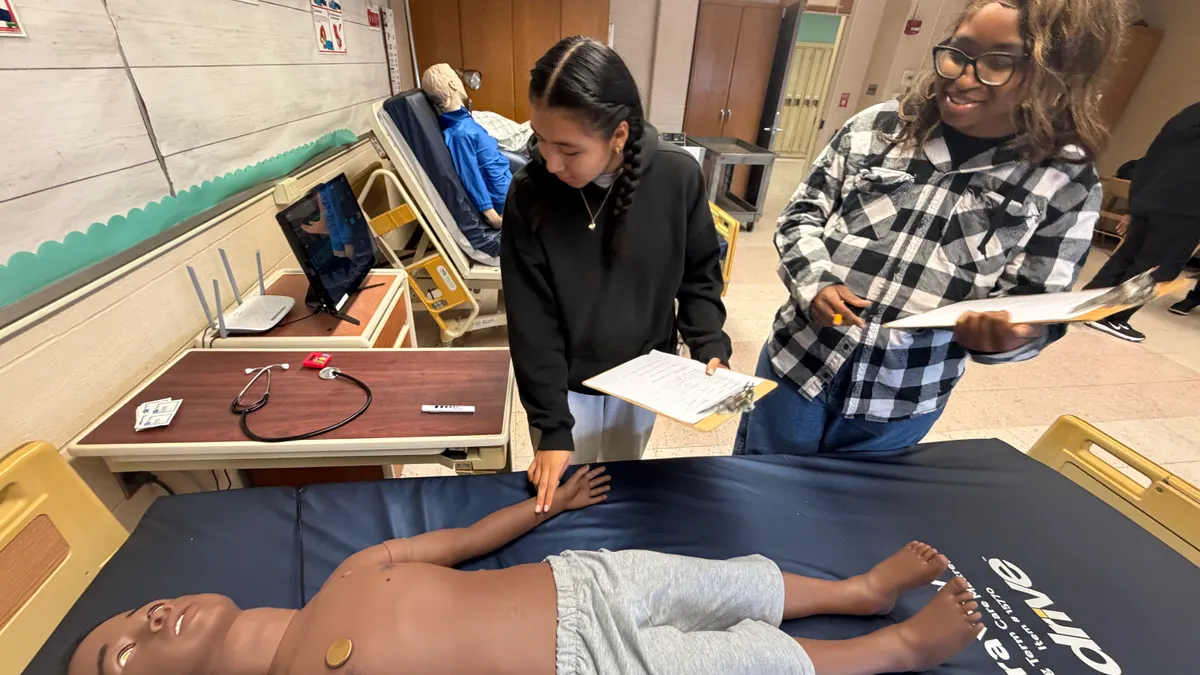At Bayfield High School in Colorado, the after-school theater program is a collaborative affair. Teachers get involved, parents chip in for costumes, and students commit to working, after the final bell, on its two shows a year.
The program's director, Sarah Ripley — who also teaches special education at Bayfield Middle School — has 41 students participating this year in the school’s production of “Matilda” — a huge leap from the original 12 signups she got previously, mostly by persuading them during lunch periods, she said.
And that increased enthusiasm is rewarded. Everyone who signs up gets a role in the school’s production — whether it’s as a chorus member or a set designer — and Ripley's watched the transformation students have undergone over the past two years.
“They walk away with a newfound confidence, presentation skills, vocal skills, and they find relationships that last for life,” Ripley told Education Dive. “They walk with their head higher.”
Despite stressing STEM education, theater still a priority
Even in an era when science, technology, engineering and mathematics (STEM) programs are being lauded and encouraged among students, theater programs are still championed by many districts and schools.
Students who participate in theater can gain a number of soft skills — communication, listening skills and self-confidence, to name just a few — which can’t be easily measured by standardized tests and yet play crucial roles in how graduates may fare when they enter the workforce. Most students who participate in are in middle and high school, as just 4% of elementary schools have theater programs, Julie Cohen Theobald, executive director of the international Educational Theatre Association (EdTA), told Education Dive.
Whether it's through a required or elective program offered during the school day, an after-school club like that at Bayfield High School, or through an English class where students act out scenes as they read a play aloud, those who have exposure to theater arts can elevate not only their academic performance, but also their social-emotional skills.
This is key for when students eventually leave school and start a future career in any field, as skills developed in the theater, such as teamwork and self-reflection, are among those employers are seeking in prospective applicants. And, according to a 2018 job outlook survey, while these skills are desirable in potential employees, only about 42% of employers rated recent college graduates as competent in work ethic and professionalism.
A pathway to developing soft skills
Theobald believes that, without a doubt, theater equips students with skills that are easily transferable to a future outside the classroom. She notes that theater itself — even just the construct of putting on a play and having other people depend on your participation — pushes students to handle details like deadlines that can’t be missed and hold themselves accountable.
“There is also a focus on creativity and risk-taking,” Theobald told Education Dive. “It’s such an important skill for 21st-century students to have — to be able to jump in and take risks.”
Rejection, while not enjoyable, is almost inevitable for anyone pursuing a career in theater. But as students learn to handle rejection, they also uncover a sense of resilience, determination and a desire to challenge themselves to continue to stick with it until they achieve their goals.
Theobald agreed that employers, herself included, often look for the four C’s: critical thinking, communication, collaboration and creativity, all of which are also needed to successfully put on a play.
“Collaboration and creativity are some of the most important things I look for when I interview people for jobs,” she said.
Integrating theater with core academics
Since the Cincinnati-based EdTA helped with the release of the National Core Arts Standards in 2014 — which guide P-12 educators in dance, media arts, music, theater and visual arts instruction — 27 states have revised standards in at least one arts discipline. And while these standards outline how theater can be pursued as an academic subject, it's a discipline that has long been woven into a multitude of subjects, from English language arts to history.
The Folger Shakespeare Library in Washington, D.C., for instance, works directly with English teachers to bring the writing of the Bard to middle and high schools, according to Director of Education Peggy O'Brien. While it’s not unusual to find Shakespearean plays inside a high school or middle school classroom, Folger's approach to curricula surrounding the plays involves "connect[ing] students with Shakespeare’s language head on, so that they own the plays and everything in them," according to the library's website.
To O’Brien, this approach starts with just two lines.
“[Students] realize it’s not complicated and they can understand it,” O’Brien told Education Dive. “Even with kids in AP and IB classes, focus on the language and how it works.”
Folger also maintains an online teacher community, Forsooth!, which provides access to educational resources including instruction modules, images, information and details about professional development programs for teachers.
There are resources for students, too, who can apply for school residencies if they live in the D.C., Virginia and Maryland metropolitan area. These students, who range from 3rd- to 12th-graders, prepare to perform in one of Folger’s student festivals where they edit, direct and help stage performances of Shakespeare.
It all goes to the heart of O’Brien’s belief that “engagement is where learning happens."
Some of what students walk away with is not just academic abilities, but also a new understanding of themselves. In just two years, Ripley has seen students at Bayfield High School, who were recruited to help with the school’s first play, grow into confident, young adults. And in doing so, they've helped steer the program and bring younger peers into the wings — or onstage.
"The original 12 are now leaders," Ripley told Education Dive. "It’s cool to see the evolution of a shy kid as they become a senior member leading 40 other kids. It’s an incredible experience, too, for me."



















